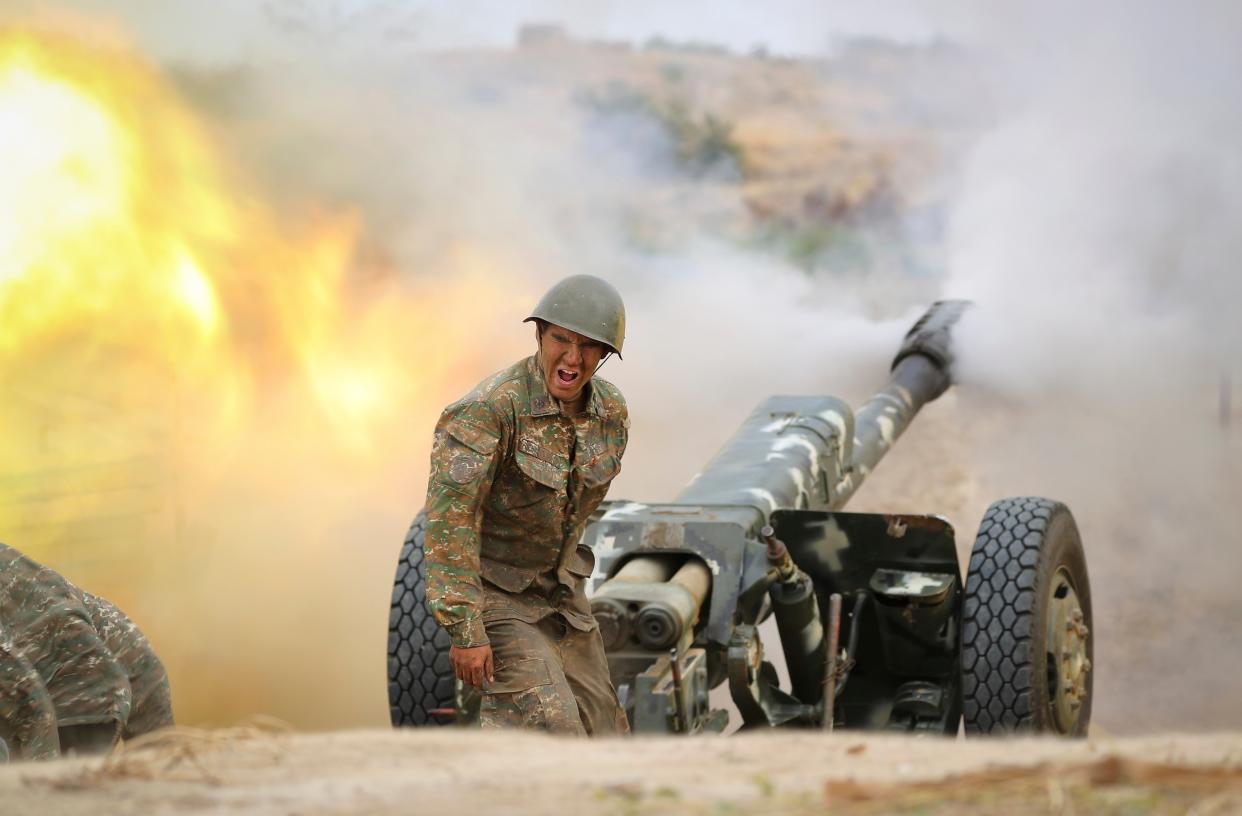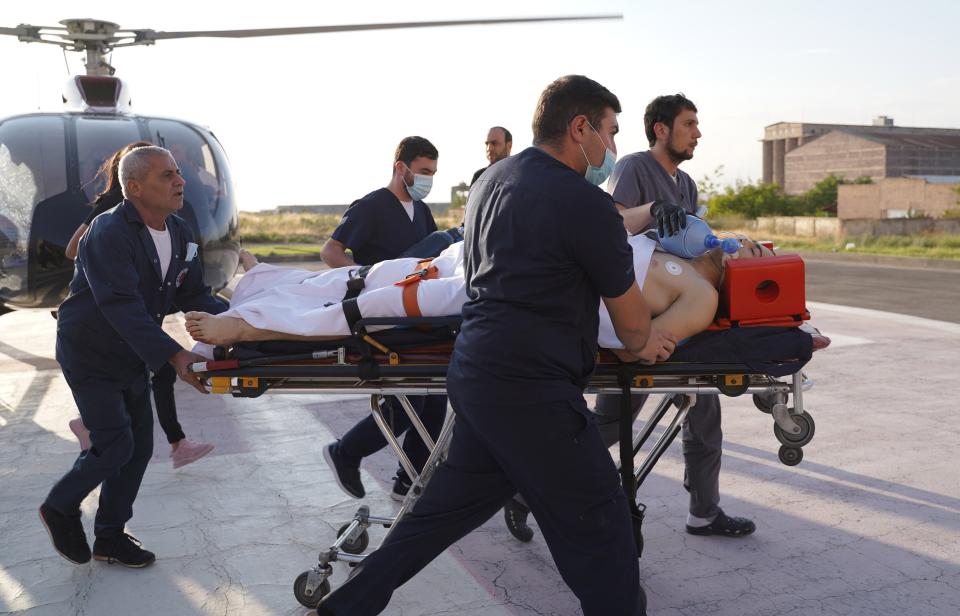Armenia claims fighter jet shot down by Turkey as conflict with Azerbaijan grows

Armenia said that one of its fighter jets was shot down in its confrontation with Azerbaijan, blaming Turkey’s air force despite denials by both Ankara and Baku.
Armenia claimed that a Turkish F-16 fighter jet shot down one of its Su-25 warplanes over its own territory, killing the pilot.
The Armenian defence ministry said the Turkish fighter jet was over Azerbaijani territory when it shot down the Russian-built Armenian plane, which was on a combat mission. A Turkish official called the claim a “cheap propaganda” stunt.
“The claim that Turkey shot down an Armenian fighter jet is absolutely untrue,” said Fahrettin Altun, a spokesman for Turkish President Recep Tayyip Erdogan. “Armenia should withdraw from the territories under its occupation instead of resorting to cheap propaganda tricks.”
The downing of the plane underscored the threat of recently renewed fighting between Armenia and Azerbaijan over the Nagorno-Karabakh region expanding beyond the breakaway enclave and raising the possibility of all-out war between the two neighbours and the involvement of regional powers.
An Azerbaijani official said Armenian forces Tuesday morning fired upon its positions from positions outside the mountainous enclave, which Armenia seized in a 1992-1994 war. Meanwhile, an Azerbaijani drone struck a civilian bus in the Armenian town of Vardenis.
“Our military has given reports that [Armenians] have started to expand this war,” Hikmet Hajiyev, an adviser to Azerbaijan President Ilham Aliyev, told reporters in a briefing. “We have reports that Armenia is attacking from its own territory.”
Armenian officials said Azerbaijan had escalated the exchanges by engaging highly destructive weapon systems. In a statement on Tuesday morning, military spokesman Shushan Stepanyan reported the use of Smerch rockets, TOS-1 heavy flamethrower systems and other missiles.
“The Armenian military warns that it has no choice but to switch to using strike systems of greater range and destructive power,” she said.
Turkey, the major patron of Azerbaijan, is also considering sending troops in support of Baku, according to officials cited in the pro-government Milliyet newspaper. Turkey’s foreign ministry has said it would “stand by Azerbaijan whichever way it prefers”.
Officially, nearly a hundred people have been killed in the latest round of fighting, which began Sunday. At least 12 of them are civilians. The numbers are likely much higher given the under-reporting of soldiers killed in action on both sides.
The ferocity of the battle has raised the prospect that the conflict could engulf a wider geographic area, imperilling civilians and crucial oil and gas infrastructure.
“There are few safety valves in terms of a military hotline between the two countries,” said Richard Giragosian, founder of the Regional Studies Center, a think tank in Yerevan. “The danger here is the risk of an expanded war by accident based on misunderstanding.”
The two peoples have been fighting over the mountainous enclave for decades, despite attempts at mediation by world powers. But in a mark that hostilities are worsening, fighting broke out in July between the two countries in an area far from Nagorno-Karabakh, a landlocked region which is ruled by a puppet administration loyal to Yerevan and backed by Armenian military power.

In recent years both countries have begun building up their arsenals of missiles, war planes, drones and anti-aircraft in what experts have described as an arms race with potentially cataclysmic consequences.
Turkey, which is linguistically close to Azerbaijan and historically hostile to Armenia, has also taken up the cause of Nagorno-Karabakh and is boisterously backing the leadership in Baku. “There is only one solution for this problem: Armenia must withdraw from Azerbaijan soil,” Turkish foreign minister Mevlut Cavusoglu said on Tuesday.
Media reports have accused Turkey of deploying Syrian mercenaries to Azerbaijan, but Mr Hajiyev rejected the accusation. Mr Giragosian, a former US Senate staffer and US Army Ranger with security contacts, says Western and Middle Eastern intelligence sources told him that the allegation of Syrians being deployed to the Caucasus could not be confirmed.
Russia has been a major patron of Armenia, but also enjoys strong economic and military ties to Baku. Moscow has called for a cessation of hostilities and begun to criticise Turkey’s aggressive support for Azerbaijan.
“The Kremlin’s starting point is the need for immediate ceasefire,” Dmitry Peskov, a spokesman for Vladimir Putin, told reporters. “Any statement of military assistance undoubtedly adds fuel to the flames. We ask all countries including partners like Turkey to do everything to convince conflicting sides to cease fire.”
Despite the escalating tensions, Mr Hajiyev said diplomatic channels remain open, and suggested Azerbaijan would act with restraint. “We’re very cautious,” he said. “We don’t have any military goal in Armenia.”
Mr Giragosian said neither side wanted an all-out war but were hobbled by miscommunication and strained by domestic politics.
“They are very hesitant to widen the scope of the fighting,” he said. “For Azerbaijan, this is a limited campaign simply to seize some territory. There’s expectations and pressure to deliver a military victory. There was a closing window of opportunity. Either it would have to be now or have to wait for spring next year. They wanted to seize the moment.”
Read more
Armenia-Azerbaijan conflict: Dozens killed as heavy fighting enters third day
Armenia-Azerbaijan: A local conflict with a frightening global reach


